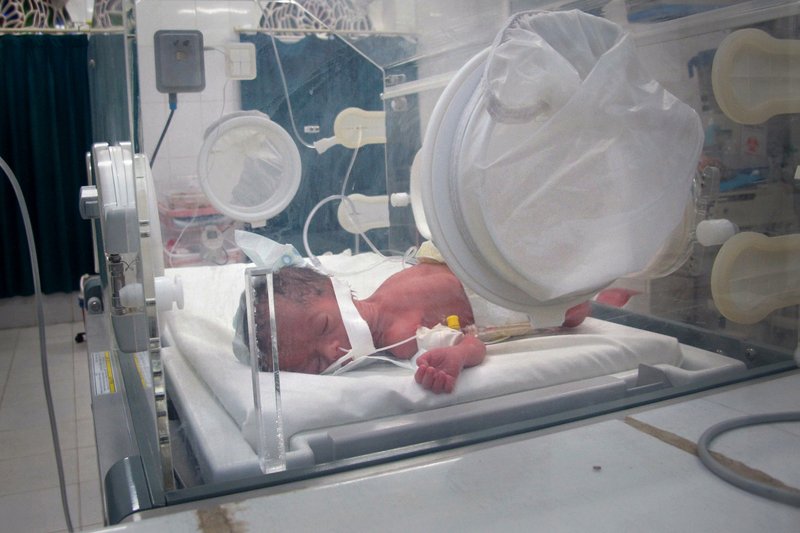HAJJAH, Yemen -- Surviving is a struggle in Yemen. After nearly two years of war, thousands of children and adults have died from treatable diseases, illnesses and injuries as the health-care system collapses.
The situation is deteriorating quickly. Vital drugs, vaccines and medical equipment often cannot enter the country because of an air, sea and land blockade imposed by a coalition of Persian Gulf nations seeking to defeat area rebels.
Because of a banking crisis, traders cannot afford to import wheat and other staple foods, triggering alarm that hunger and illness will soon worsen. Government medical workers have not been paid in four months.
The human fallout is visible at Al-Jamhuri Hospital, a large government facility built in 1950 that is tucked behind high walls in the northwestern city of Hajjah. Like every hospital in the country, it has been under intense stress. Last year, an airstrike hit about 100 yards from its green front gate, killing 18 people and wounding 120.
The stress went into overdrive in August when coalition warplanes destroyed the Abs hospital, killing 19 people. It was the latest in a series of assaults on medical facilities that human-rights activists say are war crimes. Doctors Without Borders, the medical charity that ran the facility, pulled out its international staff from six hospitals in northwestern Yemen.
Overnight, Al-Jamhuri Hospital became the only government hospital for the province and nearby areas, where 2 million people live.
The coalition supplied with weapons, intelligence and other support from the United States, frequently bombs the front-line region that borders Saudi Arabia. The coalition seeks to defeat rebels known as Houthis and restore an internationally recognized government to power.
At least 274 health facilities have been damaged or destroyed in the fighting, and 12 health-care workers have been killed, according to the United Nations. More than 14 million people in the region, half of them children, lack access to basic health care.
"We are feeling the pressure from so many directions," said Mohamed As Sowmaliye, the director at the Al-Jamhuri Hospital, who narrowly escaped an airstrike outside the city a day earlier as he traveled to the capital, Sanaa, to seek more support for the hospital.
The hospital has 160 beds but receives as many as 500 patients a day. Some are treated in beds in the hallways.
They are the fortunate ones: They somehow found a way to get to the hospital.
"The others -- we don't see them," said Colette Gadenne, the Yemen head of mission for Doctors Without Borders. "They die very far from our eyes."
The hospital has just one defibrillator. Ventilation machines and other vital equipment are broken down, including some of the incubators in the maternity war.
There is only one machine to sterilize surgical instruments in the entire hospital, and it does not work properly. The blood transfusion device needs repair. There are severe electricity blackouts, so the hospital operates most of the time on generators. Its biggest operating cost is fuel.
Spare parts from abroad are often delayed at ports for months at a time because of the blockade by the Houthis and bureaucratic inefficiency. The hospital can no longer afford the items anyway.
Eighty percent of the regional government's revenue came from customs duties at the Saudi border, which is now closed. The banking and liquidity crisis has raised more obstacles.
"The problem we are facing now is we don't have cash," said Abdul Malik Jahaf, the deputy governor. "We are incapable of providing even the simplest service here with the means we have."
Today, the hospital depends largely on meager fees from patients and assistance from international aid agencies. It owes $55,000 to the water department.
Al-Jamhuri Hospital is considered one of the better functioning hospitals in the country. Doctors Without Borders runs its emergency room, and the World Health Organization provides fuel and other support. "Without international assistance," Sowmaliye said, "the hospital would have closed down."
The hospital is seeing more cases of measles, malaria and skin diseases, mostly affecting the more than 3 million people displaced by the fighting.
Many people live in tents or in the open, with limited access to clean water. In the past, western and local aid agencies regularly visited remote areas to spray pesticides and provide other assistance to prevent such diseases.
"But with the war, all this stopped," said Mansour Al-Hajaji, a hospital official.
Now, cholera is a growing concern. Once nearly eradicated, U.N. workers have so far recorded 122 confirmed cases, with 10 confirmed deaths and 72 suspected deaths. In mid-November, the hospital opened a cholera treatment center, with funds from the WHO. It has received 200 suspected cases of cholera.
The staff is also seeing more injuries from motorcycle accidents. With soaring fuel prices, a growing number of people use motorcycles for transportation. There are also more displaced people arriving with bites from street dogs. But the hospital cannot treat them.
Doctors Without Borders used to provide rabies vaccines, but that stopped because of the blockade.
A Section on 12/31/2016

